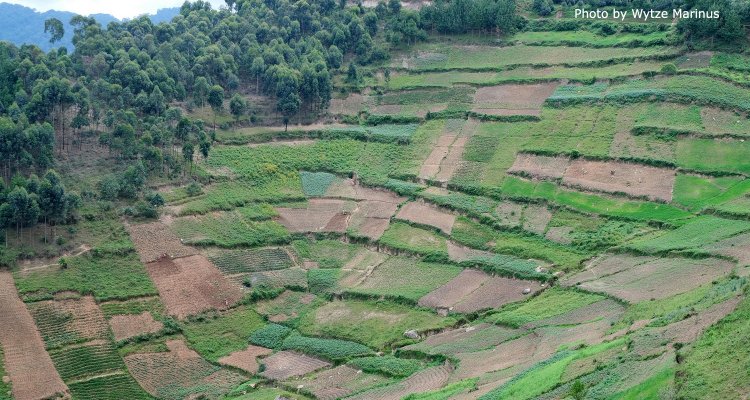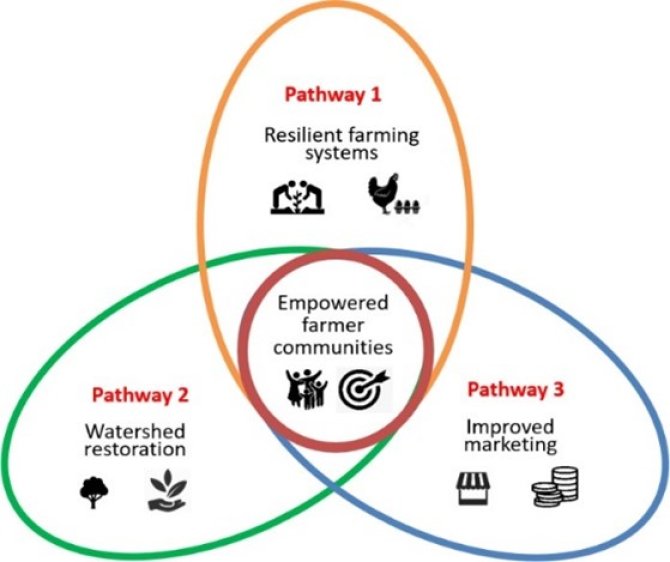
Project
CommonGround Uganda
Watersheds in the densely populated highlands of Uganda are increasingly threatened by land degradation, due to increased land use for agricultural production, biodiversity loss and uncontrolled extraction of natural resources such as timber. This leads to a decrease in the resilience of these watersheds to cope with climate and weather-related impacts, as well as an increased vulnerability of local farmer communities, as they depend on the land and its natural resources. Past interventions to reverse ongoing watershed degradation in these highlands were often ineffective, because of a focus on short-term and often top-down implementation of activities, rather than on long term (behavioural) changes in the management of natural resources.
CommonGround considers that a paradigm change is needed towards bottom-up, sustainable development of the (smallholder) agricultural sector to restore the resilience of Ugandan highland watersheds and farming systems. This implies empowering farmers to become self-reliant and to farm and manage their land in balance with nature. The goal of CommonGround is therefore 'to build resilient farmer communities and watersheds in the highlands of Uganda, based on sustainable farming systems, restored watersheds and improved marketing opportunities.'
The project is led by WENR and implemented by ISSD Uganda. With a budget of 11M euro over a period of 4 years, CommonGround will be rolled-out in the regions of Rwenzori (Fort Portal) and Kigezi (Kabale). A central concept of CommonGround is 'resilience-based stewardship', which means that stakeholders in a landscape take theirresponsibility to be good stewardsof the land and its natural resources, by realizing that this resource base is the foundation of their livelihoods.
PIP approach
Three pathways
CommonGround will focus on three pathways that are closely connected to each other, and that are facilitated by a cross-cutting foundation that underlies all other activities: empowered farmer communities & watershed stakeholders. We will build empowerment through awareness raising and capacity-building on resilience-based stewardship throughout the project, as such creating local ownership and assuring sustainability of all activities in the three pathways:
- Pathway 1 focuses on establishing resilient farming systems, through empowering 100,000 households to create farm visions and action plans with a diverse set of integrated farm and land management activities, which are scaled-out through farmer-to-farmer transfer of knowledge throughout each watershed.
- Pathway 2 focuses on collective actions for watershed restoration, with all watershed stakeholders, starting in degradation hotspots and working towards restoring the upstream (steepest and most erosion-prone) part of the watersheds, based on watershed management plans and enabled by organised and motivated local stakeholders.
- Pathway 3 works on marketing opportunities for all farmers engaged in the project and the wider community, by improving general marketaccess, strengthening value chains of key crop commodities, and supporting viable business plans for diverse local initiatives, particularly entrepreneurial groups of women and youth.
Research for development is key and cross-cutting in the CommonGround project. Through effective M&E alongside research conducted by two Ugandan PhD students, the project will contribute to evidence-based strategy development and new scientific insights. As such, CommonGround Uganda aims to show how a bottom-up inclusive approach to sustainable development of the smallholder agricultural sector can contribute to restoring the resilience of highland communities and watersheds in Uganda, providing an example and lessons learned for future CommonGround projects in other parts of (East) Africa.

